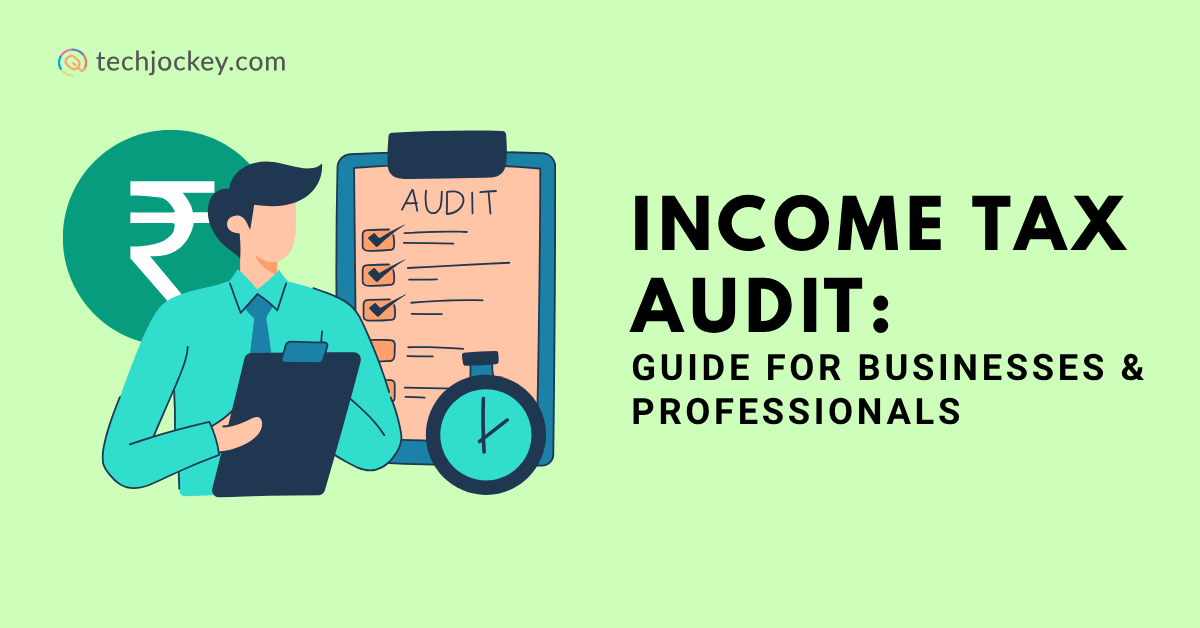
Business may be exciting, but when it comes to taxes, even a small slip can turn into a big headache. And and and…. if you are an Indian business owner, dealing with income tax is another big task!
But you have to stay on the right side of the Income Tax Act to keep your business compliant. And one term that often sends shivers down the spine of many business owners is income tax audit.
This blog will break down everything about income tax audit:
Let’s jump in.
In simple terms, an income tax audit is going through your books of accounts as per the Income Tax Act, 1961. As companies are subjected to statutory audit (under company law) or costs audit (under cost accounting law), so is it for some businesses and professionals to undergo their accounts audit for tax purposes.
A Chartered Accountant (CA) conducts this audit, reviewing the accounts and confirming that amounts of income, expenses, and deductions are properly reported. The audit also ensures that the taxpayer has complied with all provisions of the income tax law.
CA prepares the results in the prescribed formats, like Form 3CA/3CB and Form 3CD, and further uploads them electronically on the Income Tax portal. This is commonly known as an ITR audit since it directly assists in filing your Income Tax Return (ITR).
A tax audit has more than compliance objectives. The main objectives of tax audit include:
Simply put, a tax audit builds trust and credibility in your financial reporting.
Applicability of tax audit is based on the turnover limit of tax audit, and other particular conditions as per the Income Tax Act.
Under Presumptive Taxation Schemes:
This implies that the minimum turnover of income tax audit is INR 1 crore in case of a business and INR 50 lakh in case of professionals, unless there are special conditions.
Although there are various forms of income tax audit, the standard audit is done under Section 44AB. The only difference is the form of the audit report that needs to be submitted:
To make the process easier and more automated, a few CAs use income tax software. Most of the details are pre-filled, which saves time.
The income tax audit process is fairly organized:
This is done to provide accountability and transparency, which leaves an electronic trail of compliance.
The due date of the tax audit usually matches the due date of ITR filing in audited cases. Traditionally, the due date is 30th September of the assessment year. But in the case of FY 2024-25 (AY 2025-26), the last date is decided as 31st October 2025. In the case of transfer pricing (international transactions), the due date is also the same, i.e., 31st October.
According to Section 271B of the Income Tax Act, you can be penalized in case you do not have your accounts audited and submitted on time.
The penalty is around:
But in case you can show a reasonable cause (natural calamity, auditor resignation, loss of accounts through accident, or any other valid cause), the penalty can be waived.
Final Thoughts
Income tax audit might seem an unnecessary burden, but it is very crucial to maintain your financial records properly. Knowing everything from income tax audit rules to applicability and due date can help you avoid penalties and maintain a good relationship with tax authorities.
Overall, income tax audit is not only about compliance, but also about maintaining transparency in financial records, thus creating a credible financial base for your business.
An income tax audit is reviewing the books of accounts by a Chartered Accountant to ensure that everything is filed correctly. It’s done under Section 44AB of the Income Tax Act.
INR 1 crore for businesses (or INR 10 crores if 95%+ transactions are digital) and INR 50 lakh for professionals.
The audit report is filed in prescribed forms – Form 3CA/3CB and Form 3CD. In some cases, Form 3CE is also applicable.
The last date for tax audit for the financial year 2024-25 is 31st October 2025.
No. It is only required by the businesses that cross turnover thresholds or come under specific conditions of the Income Tax Act.
You might have to pay fines as per Section 271B. The penalty could be up to INR 1.5 lakh, unless you provide a reasonable cause for the tax audit not being done.
There are no fixed charges for a CA audit. It totally depends on the business size, volume of transactions, and complexity of accounts. It could range from INR 10,000 to INR 25,000 for a small business. However, for large businesses, the charges could be higher.
It stands to reason that precise data reporting is the core of any smart business… Read More
You no longer have to be reliant on an IT help desk for every minor… Read More
Shift scheduling defines the quality of every working individual's workday more than most leadership teams… Read More
Threats in cyberspace are getting increasingly sophisticated. Antivirus software and firewalls are no longer effective… Read More
Office culture and compensation are no longer the only factors shaping employee experience. It is… Read More
In the modern world, every organization manages huge volumes of digital information, including emails and… Read More